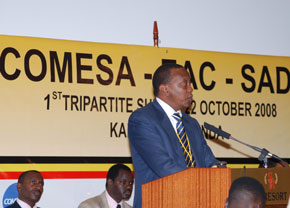
By Independent Reporter
World Bank Development Report 2009 diverts from tradition on how the poor can create and grow wealth
Released on November 7, 2008, in Washington DC, the World Development Report 2009: Reshaping Economic Geography comes at a time of severe economic crisis, which history shows can cause nations to become inward-looking, sometimes with negative consequences.
The report argues that policies facilitating geographic concentration and economic integration within and across countries will promote long-term growth, especially in Africa.
Growth does not come to every place at once, with markets favoring some places over others, said Indermit S. Gill, director of the report. To encourage prosperity, governments should facilitate the geographic concentration of production, rather than fight it. But they must also institute policies that make the provision of basic needs”schools, security, streets, and sanitation”more universal.
The report notes that Sub-Saharan Africa’s (SSA) challenges, including scattered populations and deep national, religious, and ethnic divisions, can be resolved through better urbanization, domestic specialisation, and regional integration.
Regional cooperation, labour mobility, investments in trade, communication and transport infrastructure, and peace and stability need to remain high on our agenda, even as countries work to contain the spillover effects of the global financial crisis, said Shanta Devarajan, chief economist of the World Banks Africa Region.
An estimated three quarters of economic production worldwide takes place in cities; Greater Tokyo, for example, accounts for 40 percent of Japans total output on just 4 percent of its land area. In the developing world, this concentration has been accompanied by sizeable spatial disparities in living standards and welfare.
But the location of economic activity in the world is rapidly changing. In the last fifty years, the share of global GDP of today’s rich countries has been about 80 percent. Over the next few decades, projections indicate this could fall to 40 percent. But this will require policies that encourage rural-urban transformation; focusing on economies of scale, falling transport costs and factor mobility.
International boundaries still matter, but integration can help developing countries leverage economies of scale, lower transport costs and increase trade, especially in SSA, which has the highest share of its population (40 percent) in land-locked countries.
The report suggests that Africa would benefit from “Regional Economic Areas†that would bind together the economic interests of leading and lagging countries, and provide a framework for providing regional public goods.Â
Regional integration can take many forms, from global trade agreements to regional economic cooperation treaties, single purpose agreements (e.g. regional power pools), and de facto integration, for example, when light border enforcement allows informal labor migration.Â
Action on this front is already under way. For example, in 2007, the U.K. allocated US$1.4 billion over the coming decade to aid efforts by Burundi, Kenya, Rwanda, Tanzania, and Uganda to revitalise the East African Economic Community.
The report also proposes restructuring foreign aid to facilitate regional trade integration and access to ports through multi-country infrastructure projects; strengthening regional trade and financial integration, improving and information technology; encouraging free trade policies, and better design of export processing zones.
In Africa’s lagging, landlocked countries, investments should be in people”education, health, and other social infrastructure”rather than in places, while in leading coastal countries, the emphasis should be on physical infrastructure and better integration with global markets.
Western Europe, today a highly integrated region, started small and kept expectations realistic, said Katherine Sierra, World Bank Vice President, Sustainable Development. In Africa, infrastructure projects such as hydroelectric power, transport, and ICT projects are a good place to start.
 The Independent Uganda: You get the Truth we Pay the Price
The Independent Uganda: You get the Truth we Pay the Price



